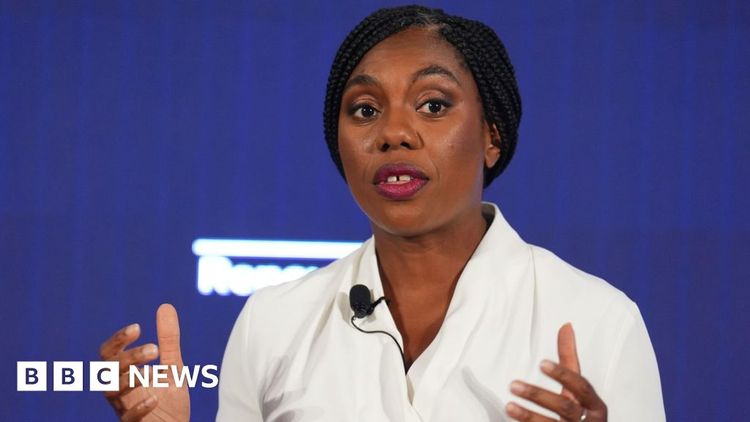Kemi Badenoch: Tories need to stop acting like Labour

Kemi Badenoch, who is running for leadership of the Conservative Party, has stated that in order to regain power, the party must cease imitating the actions of the Labour Party.
Starting her campaign with a speech in central London, the shadow communities secretary admitted that one of the missteps her party made while in power was being inconsistent between their words and actions.
She is advocating for less government involvement, suggesting that the government should focus on a smaller number of tasks but should excel in those tasks.
Ms Badenoch is among six contenders vying for the position of the next Conservative leader, with the official announcement scheduled for 2 November.
Her campaign is called Renewal 2030, as she believes that the current government is not likely to remain in power until the next ten years, and therefore, it is important to address future issues now.
Ms Badenoch mentioned that in order to regain the confidence of the public, the Tories must not simply focus on criticizing Labour or rehashing old policy debates from the previous Parliament.
She claimed that the reason for the Tories losing the election in July was because the public was unaware of their beliefs and that they were focused more on managerial politics that lacked solid principles.
She informed a gathering of fans and reporters that "a government that attempts to handle all tasks may ultimately fail to accomplish anything".
She admitted that this was something we did wrong.
"We expressed conservative beliefs in our words, but our actions aligned more closely with liberal values."
The ex-business secretary used the net zero targets as an example to emphasize the importance of finding solutions to reduce greenhouse gases in the atmosphere. He raised concerns about establishing targets in laws without a clear plan on how to achieve them, saying it relies too much on regulations instead of promoting innovation.
When discussing immigration, she suggested that individuals should not be made to feel ashamed for voicing concerns about the influx of people entering the country, especially if it is altering the environment they are familiar with and cherish.
Some of the other people running for leadership, like Robert Jenrick and Tom Tugendhat, are suggesting we should limit the number of people who can come to our country legally.
Nevertheless, Ms. Badenoch stated that this would not resolve the issue.
"When David Cameron took over, we had a limit of tens of thousands," she stated.
We should reflect on why our previous approach failed instead of simply making another pledge.
Additionally, she expressed her disagreement with members of the Conservative Party who were advocating for the United Kingdom to withdraw from the European Convention on Human Rights (ECHR). This convention outlines the rights and liberties that individuals in countries that are signatories are entitled to.
Skeptics, such as Mr. Jenrick, have contended that the agreement restricts the UK's capacity to expel asylum seekers and discourage unlawful migration.
However, Ms Badenoch noted that withdrawing from the ECHR alone would not solve the issue, as many other countries who are part of the agreement are still able to expel the majority of individuals they wish to deport.
"We must consider the entire system," she stated.
Ms Badenoch gained approval from certain individuals within the conservative party for her outspoken criticism of "identity politics" during her time as minister responsible for women and equalities.
Yet, she dismissed the critique that she focused more on "cultural conflicts" rather than the essential issues of opposing politics.
She stated that those who claim she only focused on culture wars were not properly observing. She maintained that she was simply carrying out her duties.
As the minister in charge of equalities, I had to address challenging topics like race and gender that made most people uncomfortable. Instead of avoiding them, I faced them head on.
At the same time, opposition party member James Cleverly started his campaign to become the leader, advocating for a society that prioritizes families over government support.
The Shadow security minister, Mr. Tugendhat, is set to kick off his campaign on Tuesday. Other contenders for leadership, such as Mr. Jenrick, Dame Priti Patel, and Mel Stride, have also been making speeches and promoting themselves in the media recently.
Right now, their goal is to gain the support of other Conservative Members of Parliament. They will narrow down the candidates to four through a series of votes before the party's yearly conference in late September. Eventually, they will select two final contenders.
The final two candidates will be picked by party members, and the winner will be revealed on November 2nd.









































